Seven elite women athletes who had to justify, explain or defend the way they look
Body-shaming against female Olympians and other sportswomen is rife. Water polo player Paula Leitón is the latest to be subjected to intense physical scrutiny
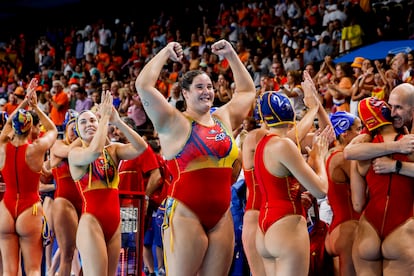
Because they’re fat. Because they’re thin. Because they’re wearing makeup or because they didn’t use a single swipe of mascara. Because they have too many muscles. Because they’re androgynous. Because they don’t have big breasts, or because they do. Because of distinctive facial characteristics. Because their hair is kinky. Because they’re Black. Because they’re too short. Because they’re mixed-race. Because of any reason, and because of every reason. Because all these “because” could be levelled at any woman.
“It’s all the same, national champions, world champions, Olympic champions, it doesn’t matter. If your body isn’t normative, your body will be the target of humiliation and women’s professional authority will go unrecognized” in their fields, says Isabel Tajahuerce, doctor of information sciences and expert on gender-based violence, who is also the rector’s delegate of equality at Madrid’s Universidad Complutense.
She’s talking about body shaming. Just two days ago, the practice was set into motion against water polo player Paula Leitón, who won gold in the recent Olympic Games on the Spanish team. She received fatphobic comments on social media, to which she reacted to with both indifference and a spot-on retort regarding stereotypes within the beauty canon that was met with an outpouring of support. Once again, there is debate about the intense level of scrutiny women face over their bodies.
Leitón is far from alone. In recent years, many female athletes have faced prejudice and verbal violence because of their weight or other characteristics. Here are seven elite sportswomen who have had to justify or defend the way their body looks.
Paula Leitón, water polo player
24 years old, Spanish Olympic champion
She is 6′ 2″ with the imposing stature required for her position (center forward) on the team. She’s felt obligated to give explanations for her physical appearance, given the many comments about it on social media. “Maybe they think they are going to hurt me. I know what my body is like and I love it very much. I work with it for a sport that is my life. I don’t care about the comments. I just won an Olympic gold, which is the dream I’ve had since I was a little girl,” she said on the Cuatro TV channel. “Water polo is generally a brutal sport. If you stop to look at our team, there’s three of us who are around 6′ 5″. It takes a powerful physique to endure a match. I have zero worries about what they’re saying, but if they have to keep making those comments, they should think about the other people they could be hurting. It doesn’t affect me, but it might affect a little girl out there.”
In the United States, it is estimated that 94% of adolescents have been body-shamed. And when it comes to the world of sports and weight, the latest report from Spain’s Womens’ Institute — Mujeres jóvenes y trastornos de la conducta alimentaria. Impacto de los roles y estereotipos de género (in English, Young women and eating disorders, impact of gender roles and stereotypes) — speaks to how weight-related stigma is closely linked to “a reduction in physical activity and avoiding such activity to evade more stigmatization in the area of sports.”
Imane Khelif, boxer
25 years old, Algerian Olympic champion
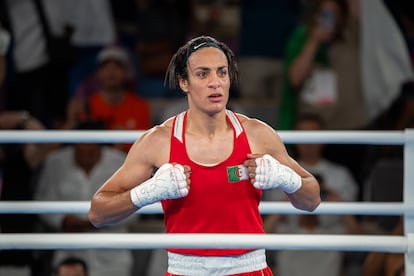
After the close of the 2024 Paris Games, Khelif announced she had filed a criminal complaint over alleged “aggravated cyber harassment” with the anti-online hatred center of the Paris Prosecutor’s Office. The move came after she was subjected to comments suggesting that she was a trans woman, a “biological man,” according to thousands of users on social media. She isn’t. Even so, attacks against Khelif multiplied after her match against Italy’s Angela Carini, who decided to leave the ring after 46 seconds when she received a powerful blow from the Algerian. “It’s not fair,” Carini reportedly told her team.
Italian Prime Minister Giorgia Meloni said that she opposed athletes with “genetically male” characteristics competing against women. Matteo Salvini, Meloni’s vice-president, said that the match was “anti-Olympic,” and that the bureaucrats who allowed the bout to go forward be ashamed of themselves. The country’s Senate president, Ignazio La Russa, wrote on Facebook, “An Algerian transsexual against an Italian woman at the Olympic Games? Is it politically incorrect to say that I support the woman?” The origin of these attacks is a leaked International Boxing Association test that showed that Khelif has XY chromosones, which are typically associated with males. Such results do not mean that she is a trans woman. Khelif has always identified as a woman and competed in women’s categories.
Mar Venegas, a professor of sociology and vice-rector of equality at the University of Granada in Spain says that a narrow reading of the situation brings one to “the usual,” aka hegemonic beauty norms, but upon closer inspection, the issue is much more complex: “The discourse of the ultra-right, of conservative and ultra-Catholic groups, says that a woman is a woman and a man is a man, with all the stereotypes that entails.”
Venegas is referring to the recent campaign from the ultra-Catholic Spanish group Hazte Oír (Make Yourself Heard) that focused on the polemic that sprang up around Khelif. “The campaign, which they brought all the way to Paris, featured a gigantic poster with the old message of ‘boys have a penis, girls have a vagina,’” she says. And that, which is apparently a matter of gender as well, has to do with “how each person should be.” For her, it’s “clear that these are discourses that look to bring back into the fold all those who have stepped even a little bit outside the gender norm. And that is also directly related to bodies.”
Fran Kirby, footballer
31 years old, plays for Chelsea and on the British national team
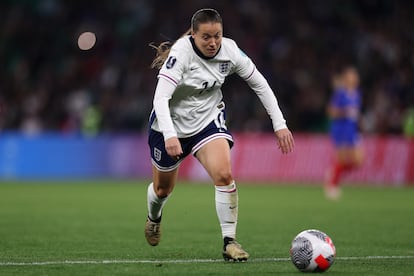
“I get called fat all the time, so I have to cover it up.” The Chelsea player, who was wearing a jacket, made the comment last year in a documentary, acknowledging the stigma that hurts female soccer players, one that is growing alongside the sport itself. Kirby is ‘5 “2, weighs 115 pounds and has been called overweight. “I have heard comments like, ‘Fran played really well, but she looked huge today.’ And I think, ‘Why is that comment necessary?’ My body’s shape shouldn’t matter. When I read or hear those things about me, I think, ‘Is that really what people think of me?’ It still affects me, but I’m managing it better. We are professional athletes and of course, we have to be in shape to play our sport, but as long as you are, our bodies shouldn’t be a subject of conversation,” she said.
She also warned, as did Leitón did, that such comments can affect less experienced athletes. “Someone who is just beginning and receives that type of comment could wind up not eating and having to compete at the highest level, their performance will decline.” Her coach Emma Hayes asked for more education when it comes to talking about women’s body images. “To perform, you need to eat carbohydrates in addition to following a healthy diet and unfortunately, there’s a problem within sports. I’m not going to limit it to women’s soccer; there’s a problem within sports with a lack of adequate nutrition. That comes from the constant demands to look a certain way, which is coming from social media.”
Tajahuerce, the academic, reminds us that any discourse around the body “does a lot of harm,” primarily to “young girls and teens who limit themselves from the get-go from playing any support that doesn’t fit into the canon.” She herself played hockey and handball for years, and remembers how “they always said, ‘Are you really going to train that hard?’, ‘You’re going to get muscles’, ‘What is your body going to look like?’”
Kate Shortman and Isabele Thorpe, synchronized swimmers
22 and 23 years old, British Olympic silver medalists
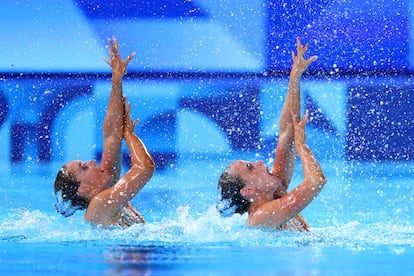
A few years ago, the two athletes received harsh criticism over their muscular forms. In response to the attacks, in 2021 they were the faces of a campaign (which featured a photoshoot of them underwater in their underwear) called #BeStrongBeBeautiful.
“It’s utterly unfair that society’s expectations for boys are to have this perfect image of health by going to the gym, lifting weights, and looking really muscular and strong, and yet for girls, it’s the opposite — you should be stick-thin and with delicate feminine features,” said Shortman. “It’s unhealthy for young girls to see this and think, ‘I have to restrict what they eat and count calories.’ It’s unhealthy mentally and physically to think that,” she added, remember how during the run-up for the Tokyo Olympic Games, she was mocked for having “big shoulders, small boobs and small bums.”
Shortman added that society’s perception of femininity doesn’t always include muscular bodies and frequently, doesn’t consider them acceptable for a woman. “Who decided that being muscular is a good thing for boys and a bad thing for girls? It’s absolute rubbish … We have to change the perception that the strong female form is not ‘feminine.’ The idea that strength and femininity do not go together is a really damaging perception for keeping women in sport but also more broadly.” In sports like synchronized swimming, similar to rhythmic and artistic gymnastics, there have been complaints leveled by athletes against coaches who make exaggerated demands for them to lose weight. Some of them have wound up with eating disorders.
Another qualitative study from last year, Body Shaming Experiences of Elite Female Athletes, which was published by the academic review OPUS Journal of Society Research, concluded that one of the many problems faced by elite athletes away from the sporting environment but also within it are “’body shaming’ experiences. Among them, “disturbing” comments and practices when they are measured, “sexist expressions in social relationships about their bodies,” and “comments that include pressure, and psychological violence in the sports culture where gender-based power relations are intense.”
Katelyn Ohashi, gymnast
27 years old, former member of Team USA
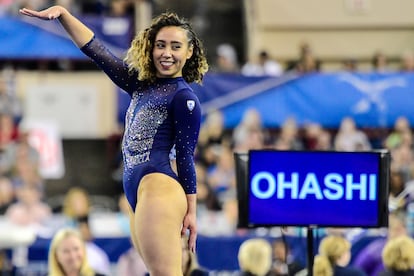
Feeling daily pressure in the gym to lose weight is exactly what Ohasi was experiencing in 2013, when she was 16 years old (she formed part of the U.S. national team between 2009 and 2013). In an interview with BBC, she said that when she began training again after taking a break due to back injury, one of her coaches told her the reason why she was experiencing pain during practices was that she had gained weight. It was a sentiment that, according to sources consulted by this publication, various gymnasts have heard throughout their sporting career in high-intensity training facilities.
Often, the athletes on the receiving end of such comments are teenagers. Ohasi puts it like this: “I was trying to work through the pain and crying literally every turn I took. I was told I didn’t look like a gymnast. I was told I looked like I’d swallowed an elephant, or looked like a pig.” She began to feel uncomfortable with her own body. “I hated taking pictures. I hated everything about myself,” says the gymnast. Such problems led to her and her friends starving themselves to feel thinner. “We didn’t understand what we were doing to our bodies and how dangerous that is.”
Garbiñe Muguruza, former tennis player
30 years old, former world champion, former member of the Spanish national team and Olympic athlete
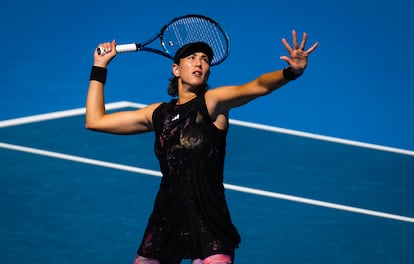
She left the sport last April. Even after abandoning the court, she’s had to respond to questions about the supposed decline of her body. She attended the 2024 Laureus Awards as a former player, and a journalist told her that on social media, her physical appearance had been criticized, that the effects of having stopped training were noticeable: “How do you take it, do you think it’s fair, do you think that women are more singled out?”
Muguruza respond with a cackle. “If I’m not training, what can I do? I want to live life, training regimens are extremely tough and when you’re able to live life more and relax, you want to enjoy that. That Olympic athlete physique… Look, we all know it, let’s be clear… it’s important to stay healthy and in shape.” Soon after, she acknowledged having been shocked by the question because no one else present (athletes and former athletes included) had been similarly questioned. “I answered humorously because I look great,” she said.
The issue is not Muguruza or Leitón’s responses, nor that of any of the female athletes who have had to deal with their bodies being judged every day, but rather, why they have to respond in the first place. They shouldn’t have to justify, explain or defend why they are the way they are. Tajahuerce, the information sciences professor says herein lies the problem: “We’re in 2024 and in a lot of ways, we’re in the same situation. Superficially, there have been changes but, in the background, there’s still this kind of thinking that women have to measure up to the established beauty canon.”
Sign up for our weekly newsletter to get more English-language news coverage from EL PAÍS USA Edition
Tu suscripción se está usando en otro dispositivo
¿Quieres añadir otro usuario a tu suscripción?
Si continúas leyendo en este dispositivo, no se podrá leer en el otro.
FlechaTu suscripción se está usando en otro dispositivo y solo puedes acceder a EL PAÍS desde un dispositivo a la vez.
Si quieres compartir tu cuenta, cambia tu suscripción a la modalidad Premium, así podrás añadir otro usuario. Cada uno accederá con su propia cuenta de email, lo que os permitirá personalizar vuestra experiencia en EL PAÍS.
¿Tienes una suscripción de empresa? Accede aquí para contratar más cuentas.
En el caso de no saber quién está usando tu cuenta, te recomendamos cambiar tu contraseña aquí.
Si decides continuar compartiendo tu cuenta, este mensaje se mostrará en tu dispositivo y en el de la otra persona que está usando tu cuenta de forma indefinida, afectando a tu experiencia de lectura. Puedes consultar aquí los términos y condiciones de la suscripción digital.








































